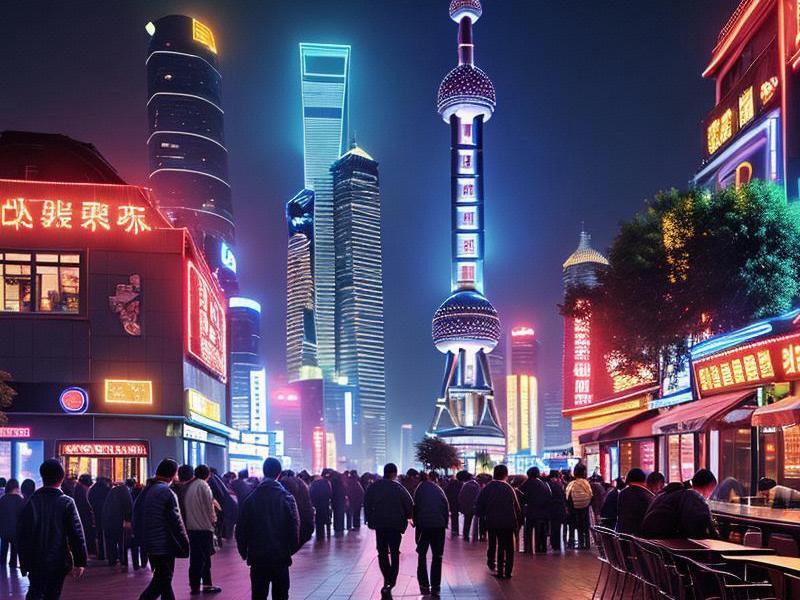
In the heart of Shanghai, where the neon lights flicker and the hum of the city never ceases, entertainment clubs stand as a testament to the city's dynamic and ever-evolving nightlife. These establishments, often synonymous with glamour, music, and socializing, have become a staple in the urban entertainment scene, attracting locals and tourists alike.
The concept of entertainment clubs in Shanghai is not new. Over the decades, they have evolved from simple bars and dance halls to sophisticated venues offering a wide range of services, including live music, DJ performances, karaoke, and even gourmet dining. They are not just places to party; they are cultural hubs where people gather to unwind, network, and experience the pulse of the city.
One of the most notable aspects of Shanghai's entertainment clubs is their ability to adapt to changing times and tastes. In recent years, there has been a noticeable shift towards more curated and themed experiences. Clubs now offer everything from high-tech light shows and immersive soundscapes to art exhibitions and fashion events. This trend reflects a broader cultural shift in China, where younger generations are seeking more meaningful and diverse forms of entertainment.
However, the rapid growth and popularity of entertainment clubs have also brought about challenges, particularly in terms of regulation. The Chinese government has been increasingly focused on ensuring that such establishments operate within the bounds of the law, emphasizing safety, hygiene, and ethical business practices. This has led to the introduction of stricter regulations, including licensing requirements, age restrictions, and curfews.
爱上海论坛 The regulatory landscape for entertainment clubs in Shanghai is overseen by multiple authorities, including the Public Security Bureau, the Health Bureau, and the Culture and Tourism Bureau. These agencies work together to ensure that clubs comply with various standards, from fire safety and emergency evacuation plans to the prevention of drug use and prostitution. While these measures are aimed at protecting the public, they have also posed challenges for club owners, who must navigate a complex web of rules and regulations.
Despite these challenges, the entertainment club industry in Shanghai continues to thrive, thanks in part to the city's status as a global financial and cultural hub. The influx of international tourists and expatriates has created a demand for high-quality entertainment options, driving innovation and competition among clubs. This has led to the emergence of some truly world-class venues that rival their counterparts in other major cities around the globe.
One such example is the "M1NT," a private members' club located in the prestigious Bund 18 building. Known for its exclusive membership policy and opulent interiors, M1NT offers a unique blend of luxury and entertainment, including fine dining, live music, and networking events. Another notable venue is the "Bar Rouge," a rooftop bar with stunning views of the Shanghai skyline, which has become a favorite among celebrities and socialites.
The impact of entertainment clubs on Shanghai's cultural landscape cannot be overstated. They serve as a microcosm of the city's diverse and dynamic society, reflecting its blend of traditional and modern influences. Through their music, art, and events, clubs contribute to the city's creative economy, providing a platform for local artists, musicians, and performers to showcase their talents.
上海夜生活论坛 Moreover, entertainment clubs play a significant role in shaping the nightlife culture of Shanghai. They offer a space where people can escape the pressures of daily life, connect with others, and experience the vibrant energy of the city. For many, these venues are more than just places to party; they are a way of life, a means of expressing individuality and freedom.
However, the rapid growth of the entertainment club industry has also raised concerns about its potential negative impacts. Critics argue that the emphasis on materialism and hedonism can detract from more meaningful forms of cultural expression. Additionally, the high costs associated with clubbing can crteeabarriers for lower-income individuals, limiting access to this aspect of the city's cultural scene.
To address these concerns, some clubs have begun to adopt more socially responsible practices. For example, certain venues have introduced initiatives to promote sustainability, such as reducing waste and conserving energy. Others have focused on creating inclusive environments, offering discounted or free entry to underrepresented groups and hosting events that celebrate diverse cultures and communities.
上海品茶论坛 The future of Shanghai's entertainment clubs will likely be shaped by a combination of factors, including technological advancements, changing consumer preferences, and ongoing regulatory developments. As the city continues to grow and evolve, so too will its nightlife scene, with new trends and innovations emerging to meet the demands of its dynamic population.
One area of potential growth is the integration of technology into entertainment clubs. From virtual reality experiences to AI-powered customer service, technology has the potential to enhance the clubbing experience in ways that were previously unimaginable. For example, some clubs have already begun using augmented reality to crteeaimmersive environments, allowing patrons to interact with digital elements in real-time.
Another trend that is gaining traction is the rise of boutique and niche clubs. These venues cater to specific tastes and interests, offering a more intimate and personalized experience compared to larger, more commercial establishments. Whether it's a jazz bar, a comedy club, or a themed party venue, these smaller clubs provide a space for people to connect over shared passions and interests.
In conclusion, Shanghai's entertainment clubs are a vital part of the city's cultural and social fabric, reflecting its dynamic and ever-evolving identity. While they face challenges related to regulation and societal expectations, they continue to thrive as hubs of creativity, innovation, and connection. As the city looks to the future, the entertainment club industry will undoubtedly play a key role in shaping the next chapter of Shanghai's nightlife story.
